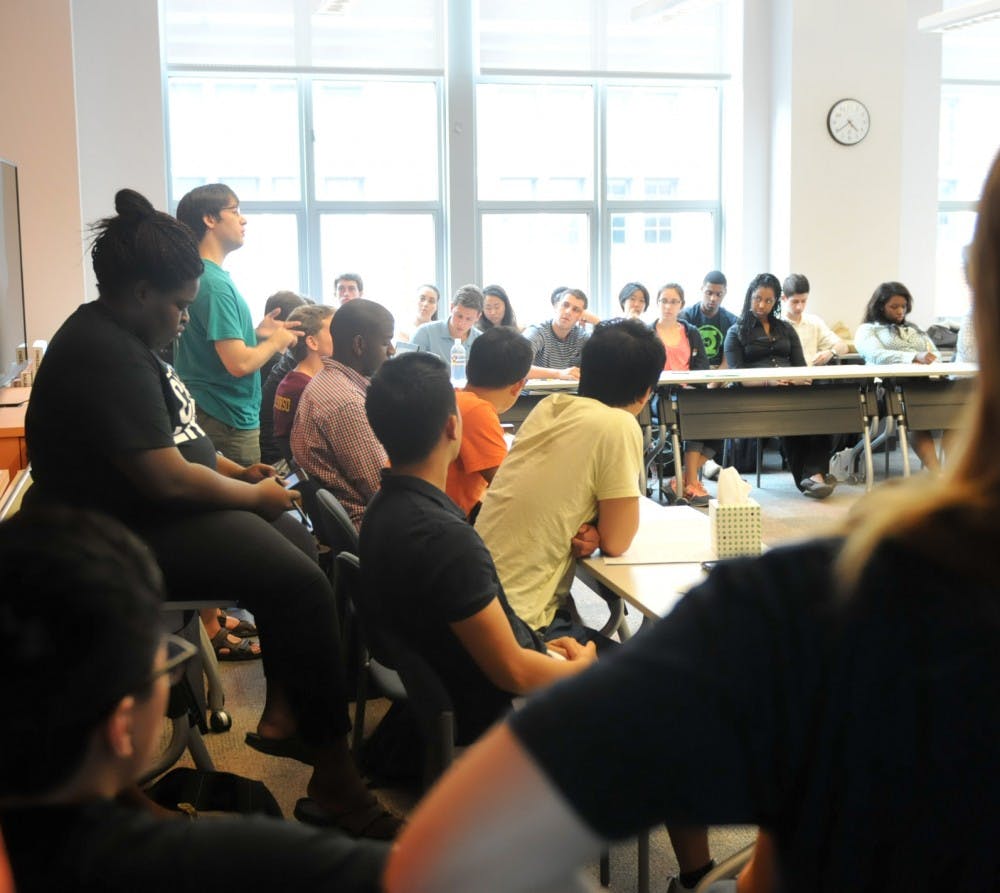The University first moved to enact changes “quickly but without haste” to its sexual misconduct policy in late July when it was informed by the Department of Education’s Office for Civil Rights that it was out of compliance with Title IX, Vice Provost for Institutional Equity & DiversityMichele Minter said at an Undergraduate Student Government town hall meeting on Sunday.
The changes — enacted unanimouslyon Sept. 15 at a meeting of the University’s faculty — are to allow equal rights of appeal to both the accuser and the accused, to remove student presence from the adjudication panel, to reduce the burden of proof for sexual assault cases from “clear and persuasive” to “preponderance of the evidence” and to allow both complainants and respondents to appoint an adviser from outside the University community.
The University is the last institution in the Ivy League to adopt these changes and so has had time to observe the effects of these changes, and these observations have not raised many red flags, Minter said. She added, speaking particularly of the student presence issue, that the Office for Civil Rights has found that student presence on the adjudication panel may have a “chilling effect” on victims coming forward. She did not state a personal opinion on the matter.
The University would have potentially lost all federal funding, including funding to the Princeton Plasma Physics Laboratory and for Pell Grants, had it failed to make the changes, Minter said.
While sexual misconduct cases will be adjudicated under the “preponderance of the evidence” standard, which requires the accused more likely than not violated the sexual misconduct policy, other cases will continue to be adjudicated under the more stringent “clear and persuasive” standard, she explained.
Some students expressed concern about the disparity between the two standards during the public comment period, others noted it is often difficult to establish a “clear and persuasive” amount of physical evidence in sexual assault cases, unlike plagiarism cases, and that the changes may encourage assault victims to come forward.
Although the accused and alleged victim will now have the opportunity to retain a lawyer as an adviser instead of a faculty or staff member, Minter explained that the lawyer will not be able to speak in place of the student.

Minter added that alleged victims and the accused will not be interviewed in the same room at the same time, and that no inference will be drawn from an accused’s refusal to answer questions in accordance with the Fifth Amendment.
Sexual misconduct cases will now be investigated and adjudicated by three trained investigators instead of a sub section of the Faculty-Student Committee on Discipline, which had adjudicated these cases until last year. The three investigators willconsist of one trained investigator under Minter’s purview, one staff member in the Office of the Dean of Undergraduate Students or in the Office of the Dean of the Graduate School, and one lawyer trained in handling sexual misconduct cases from outside the University, Minter explained.
"We are not looking for evidence; we are looking for the facts of the case,” Minter said. According to University documents detailing the changes, the three investigators will both investigate the facts of the case and decide whether the accused has violated policy. The specific penalty will be decided by an ODUS dean or a Graduate School dean.
Drawing on remarks made during the public comment period, the assembled USG Senate voted to express support for the Council on the Princeton University Community to ratify the proposed changes onSept. 29, with some reservations.

The reservations that the USG resolutions expressed include that the residential college advisers have to tell directors of student life about alleged instances of sexual misconduct, even if the alleged victim is not their advisee, that outside counsel should be made available to those without the means to hire it, and that there is a concern about the investigative and adjudicative body being one and the same.
The changes regarding the disciplinary procedure have already taken effect because of the faculty vote, but other changes that still need to be ratified include clarifications about what types of off-campus conduct are within the University’s purview, as well as about multiple issues of privacy and confidentiality.
The Senate asked the newly formed faculty-student Committee on Sexual Misconduct to investigate many of these concerns.
Some participants in the public discussion period expressed concern about the rights of the falsely accused. In response, Dean of Undergraduate Students Kathleen Deignan said she was confident that virtually no cases that have resulted in a finding of “No Finding” over the course of her career would have been changed to an adverse result against the accused because of the newly less stringent standard.
Findings of the Faculty-Student Committee on Discipline were largely unanimous, she noted, and USG president Shawon Jackson ’15 noted later that, in the proposed changes, all three investigators would have to come to a unanimous decision.
The overall effect of the process is not to prevent students from going to the police, but to have a parallel University process that will occur regardless of what occurs in the criminal justice system, Deignan explained. Minter added that Sexual Harassment/Assault Advising, Resources and Education,and the Department of Public Safety can connect alleged victims with the Princeton Police Department if they wish to pursue the case through the criminal justice system.
In those instances, the University’s normally confidential student records could be subject to a subpoena, Minter explained.
Vice President for Campus Life Cynthia Cherrey noted that, despite the town hall’s emphasis on the changes to the disciplinary process, the University wants to pay attention to possible changes in messaging, education, outreach and the SHARE program to prevent cases of sexual misconduct from occurring in the first place.
The town hall took place at4 p.m.in Frist 330.








